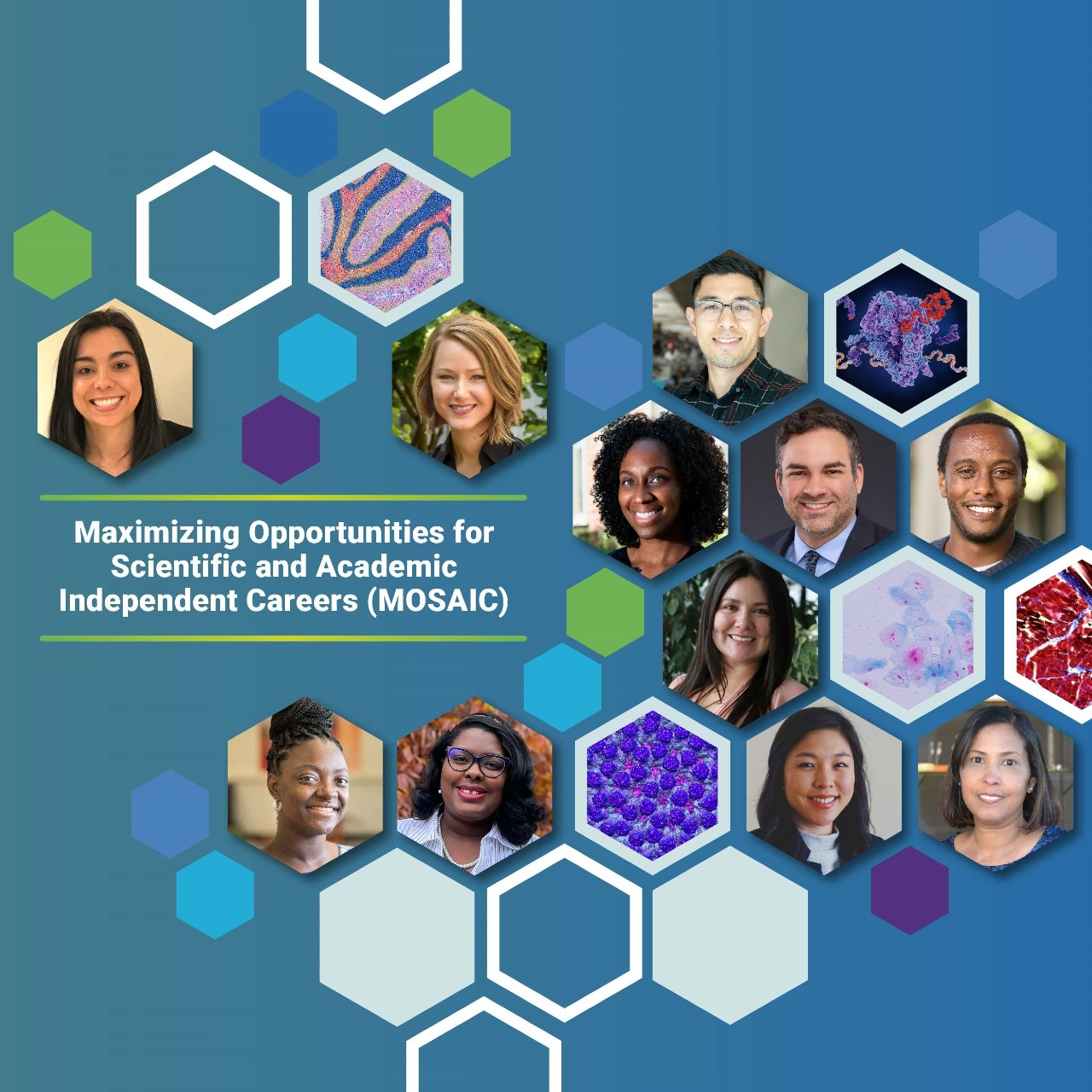Inspiring, Training, and Supporting the Next Generation of Researchers
NIMH Training Team
• 75th Anniversary
For 75 years, NIMH has transformed the understanding and treatment of mental illnesses through basic and clinical research—bringing hope to millions of people. This Director’s Message, guest written by the NIMH Training Team, is part of an anniversary series celebrating this momentous milestone.
Every January, many conversations revolve around starting anew—new paths and goals that will lead toward a brighter future. The NIMH Training Team engages in this forward thinking year-round. We understand that to continue making progress in understanding, treating, and preventing mental illnesses, the next generation of NIMH researchers needs to be highly supported and well trained.
The NIMH Training Team develops, administers, and promotes research training and career development opportunities that support hundreds of new and established researchers annually across the NIMH continuum of basic, translational, and services research. Some funding activities support individual applicants, such as early career investigators, while other opportunities are for institutions, such as universities, to develop research education and training programs that benefit entire cohorts. We also support training opportunities available through NIH-wide initiatives and collaborative research projects.
As NIMH celebrates its 75th Anniversary, we’ve reflected on what we’ve accomplished and our ongoing work, including our individual, institutional, and collaborative training activities. We hope that by sharing these opportunities, we inspire someone to take the next step and join us in the effort to use research to help the millions of people living with mental illnesses.
Individual training opportunities
NIMH supports the development of the research workforce by providing funding and training opportunities to individual researchers. This support allows the researchers to learn critical scientific skills and use new and emerging technologies, approaches, and methods to address the broad field of mental health research as it advances and evolves.
Individual training opportunities support career development, transition, and advancement for researchers across the full spectrum of NIMH’s mission, working in intramural or extramural spaces. The trainings also span the career spectrum, with opportunities for:

One example is the National Research Service Award (NRSA) program, which supports predoctoral students engaged in research leading to a doctoral degree, doctoral students working on dissertation research, and postdoctoral fellows doing research early in their careers. Through the NRSA program, NIMH supported hundreds of predoctoral and postdoctoral researchers in 2023 alone. In addition, our many mentored research career development award programs provide support for investigators who are in their final stage of research training before transitioning to becoming independent investigators.

It is important to train researchers with diverse skill sets and scientific perspectives. For example, NIMH has training programs, education and career development opportunities, supplements, and loan repayment programs for physician–scientists and other clinician–scientists engaged in both scientific research and clinical practice. These investigators’ dual scientific and clinical expertise uniquely positions them to make meaningful, clinically informed discoveries across the spectrum of NIMH-supported research.
In addition, because different people bring different perspectives and experiences to their research, it is essential that NIMH train a workforce that is diverse in a variety of ways, including its characteristics, backgrounds, and expertise. This way, a broad range of perspectives can help shape research that advances NIMH’s mission. To facilitate this effort, NIMH offers several funding opportunities and supplements to enhance the diversity of the biomedical research workforce by supporting students, fellows, and investigators from groups underrepresented in biomedical research.
Institutional training opportunities
Research does not occur in isolation and often benefits from mentoring and teaching within and across academic and clinical departments. For this reason, we have institutional training grants that provide training, mentoring, and education to support multiple researchers at an institution, such as a college, university, or foundation.
For instance, NIMH offers institutional support for creative and innovative research education programs, including short courses and research mentoring networks, that provide research education opportunities to trainees across the country. Other research education programs support physician–scientists during targeted periods of their clinical training.
Collaborative training opportunities
In addition to the research training and career development opportunities provided specifically through NIMH, the institute supports vital collaborative research training across NIH.

NIMH is part of the Maximizing Opportunities for Scientific and Academic Independent Careers Awards, or MOSAIC program , run by the National Institute of General Medical Sciences. The MOSAIC program is designed to help promising postdoctoral researchers from diverse and underrepresented backgrounds transition into faculty careers at research institutions. MOSAIC awards provide scholars up to 5 years of mentored career development and research support.
Another initiative spanning multiple NIH institutes is Neuroscience Development for Advancing the Careers of a Diverse Research Workforce , a flexible and specialized program designed to foster the development of neuroscience researchers from diverse backgrounds across career stages. The program encourages applications from organizations that propose innovative mentoring and professional development activities aligned with the institutes’ mission areas.
Additionally, NIMH participates in several collaborative research projects with training opportunities. One example of an NIH-wide project is the Brain Research Through Advancing Innovative Neurotechnologies® Initiative, or The BRAIN Initiative®.

NIMH has managed 30 scholars through the BRAIN Initiative’s Advanced Postdoctoral Career Transition Award to Promote Diversity , supporting mentored and independent postdoctoral fellows' research experiences. NIH has also announced a new institute-wide funding opportunity through the BRAIN Initiative and the NIH Blueprint for Neuroscience Research to support undergraduate students looking for neuroscience research education experiences .
Learn more about NIMH training opportunities!
If you are in the early stages of your career, you may be wondering if there is NIMH funding you can apply for to support your research. The answer is yes! But how do you begin to figure out what your options are?
NIH RePORTER is a great tool to get a sense of the types of research NIMH has already funded and what supported applications look like. Additional online and in-person training resources to help you plan for and conduct your research can be found at the NIH Office of Behavioral and Social Sciences Research .
NIMH has dedicated training program staff in each of its divisions who are eager to help. Our approach to training is uniquely engaged in that program staff work directly with applicants and awardees throughout the research process. They can:
- Assist you in finding appropriate funding opportunities
- Discuss your project with you and provide feedback before you submit your application
- Answer questions after your application has been submitted or reviewed
- Offer guidance and support after an award has been made
Don’t wait to contact NIMH research training staff—the earlier you contact us in the grant submission process, the more helpful we can be.
Over the past 75 years, NIMH has helped advance the careers of thousands of researchers across diverse areas and career stages with ever-evolving individual, institutional, and collaborative opportunities. Many of these researchers have contributed to discoveries that have revolutionized the future of mental health care. We envision the future growing even brighter as we add to those numbers over the next 75 years.

